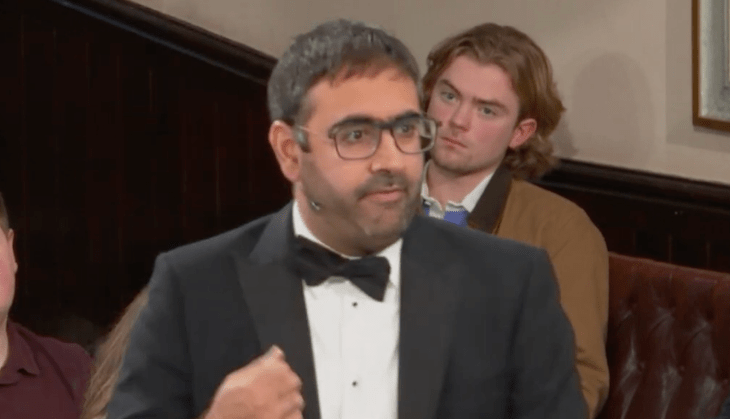Readers of progressive newspapers have occasionally been invited to admire a man called Miqdaad Versi. He was the subject of a respectful 2018 profile in the Guardian for his ‘personal mission to confront…the Islamophobia of the British press’ one complaint at a time. Versi’s ‘spreadsheet of shame’ showed ‘how flagrantly British papers get their news about Muslims wrong’. Alas, a large number of this piece’s claims about the corrections supposedly forced on shameful British newspapers by Versi were themselves wrong and had to be corrected at the bottom of the online version. That is, as it happens, a truer reflection than the Guardian intended of the organisation which Versi set up, and where he remains ‘lead strategist’.
So if the media is not a pit of anti-Muslim falsehood and hatred, what is the CfMM’s true objective?
Versi’s organisation is called the Centre for Media Monitoring (CfMM), until this week part of the Muslim Council of Britain (MCB), of which he is also spokesman. It claims to specialise in challenging false, negative and ‘Islamophobic’ reporting by the British media about Muslims and Islam, through monitoring ‘thousands of articles and broadcast clips daily’ and complaining to regulators and media outlets about those which fall short.
The CfMM claims that media falsehoods are ‘widespread’, with almost 10 per cent of news stories involving Islam ‘misrepresenting Muslims, misusing terminology or misinterpreting Islamic beliefs and practice’. As Versi puts it:
Sixty per cent of articles [about Muslims] analysed [by CfMM] associated negative aspects and behaviour with Muslims or Islam… Little wonder Islamophobia is so common in society.
These claims have been widely repeated in politics and are widely believed in Muslim Britain.
When we at Policy Exchange looked into it, however, we found that CfMM simply doesn’t substantiate these serious and damaging charges. In the group’s entire seven-year existence, the rulings database at Ipso, the press self-regulator, shows a grand total of one case brought by CfMM from which Ipso required a newspaper to make a correction: in December 2020, more than four years ago. In a further three cases brought by CfMM, the latest three years ago, Ipso found that a breach of its editors’ code had occurred but that the newspaper had already corrected the error, with no further action required.
CfMM complains directly to news outlets too. But it has made wildly varying claims about the number of articles it has monitored (from several million to several tens of thousands) and the number of successful complaints it has brought as a result (from 300 to 22.) Even taking its highest claimed number of successful complaints (300) and its lowest claimed number of articles monitored (55,500), that is about 0.5 per cent, nowhere near a tenth.
In submissions to regulators and consultations, CfMM repeatedly reuses the same, or some of the same, twenty or so news stories, often many years old, as examples of inaccurate and ‘Islamophobic’ journalism. In the group’s latest published submission, in 2023, the newest examples given were from 2020. Some old favourites had been published as long as 15 years before.
Remarkably, the CfMM’s ’60 per cent’ tally of negative stories appears to include factual accounts of Islamist terror attacks. The ‘top three offenders’, it says, are the wire services Reuters, AP and AFP, sources of almost entirely sober, factual and straight reporting – at the opposite end of the spectrum from the usual suspects of the right-wing tabloids.
So if the media is not, as it turns out, a pit of anti-Muslim falsehood and hatred, what is the CfMM’s true objective? It is, in the group’s own words, ‘taking control of the narrative’ about Islam. It appears to be to pressurise journalists to accept a partisan view of the faith held by the MCB and its activists.
CfMM tells journalists they should never use the terms ‘Islamism’, ‘Islamic extremism’ or ‘Muslim extremism’ at all. It attacks news outlets for describing terror groups, including Hamas and Islamic State, as Islamist. It appears to claim that moderate Muslims abandon their ‘religious identities’ for a ‘version of Islam that has been sanctioned by the state’, and that they may even be liberals or government spies.
CfMM seeks to pressurise journalists into a conservative view of Islam, describing the hijab, the headscarf for women, as ‘normative’. They attacked a Muslim writer, Qanta Ahmed, for ‘misrepresenting Muslim behaviour and belief’ after she wrote in The Spectator that there was ‘no basis in Islam for the niqab’, the full-face veil.
CfMM has criticised TV dramas for showing Muslim characters who do not want to wear a hijab, or who drink alcohol, or who are gay. It has openly taken the side of intimidating mobs staging banned anti-gay demonstrations outside primary schools (news reporting which criticised those demos was, it says, ‘Islamophobic’.)
CfMM claims to support free speech. But it says that press regulators must discourage ‘insults’ against Islam. Nor, it says, should the media be allowed to accuse the authorities of failing to investigate wrongdoing because the perpetrators are Muslim, as in Rotherham. It describes the reporting of grooming gangs as based on ‘shoddy’ underpinnings, and has repeatedly attacked those, such as the late Andrew Norfolk of the Times and GB News’ Charlie Peters, who have done most to expose it.
How much does this matter? Potentially, quite a lot. Versi and CfMM have been welcome guests in media offices and at Ipso, claiming to be ‘instrumental’ in drawing up the regulator’s guidance on Islam. A senior BBC News manager spoke at a CfMM event only last month, and it has been ‘feeding in’ to BBC policy. Major newspaper editors and celebrity reporters have endorsed some of CfMM’s worst, most questionable research. CfMM organises regular workshops and training events in news organisations. It says it teaches journalism students at ‘all the top universities’, and actually has done so at several.
And now, CfMM has a powerful new weapon in sight. It and the MCB are part of the wider campaign for an official definition of Islamophobia – something which, in the campaign’s words, should be used to control and police activity ‘far beyond’ anything that can currently ‘be captured as criminal’. This includes setting ‘appropriate limits to free speech’ when talking about Muslims. The government has stated its support for a definition. The man it has appointed to draw one up, Dominic Grieve, wrote a supportive foreword to the report in which these words appeared.
Most investigative journalism looks at governments, public bodies and companies. But there’s another set of people who need just as much scrutiny, and who can act with just as much shoddiness: the activist groups, working away behind the scenes, to skew society and the national conversation in wrong and dangerous directions.







Comments